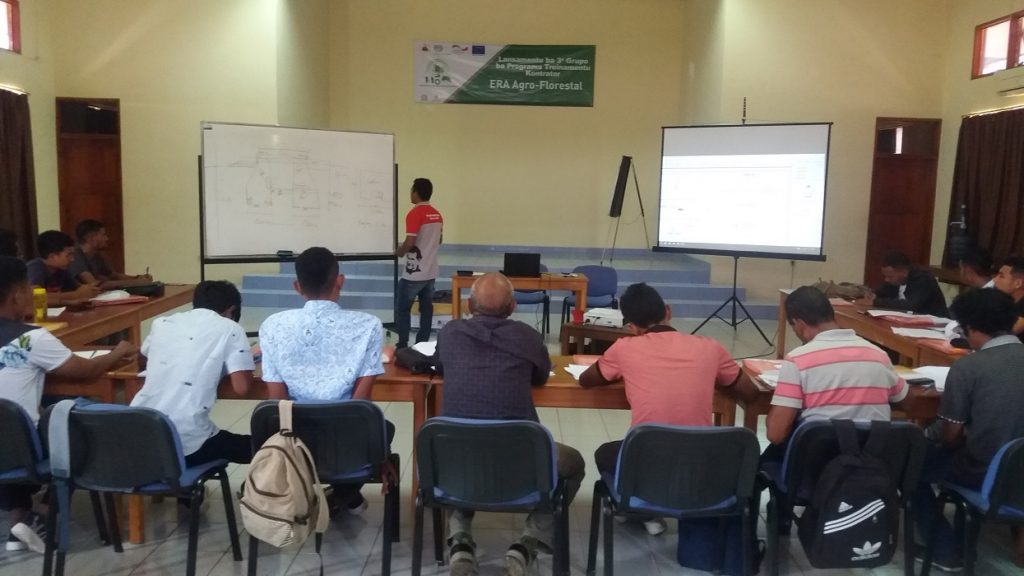
ERA PROJECT
ERA Project in short
Project Title: Enhancing Rural Access (ERA)
Objective: To improve access and income opportunities for rural communities through rehabilitation and maintenance of rural roads by trained contractors.
Key Outputs: i) 140km of rural roads rehabilitated and maintained (ii) At least 60 contractors trained in labour-based technology (LBT) and contracts management (CM) (iii) Don Bosco and IADE certified to deliver training for civil works contractors in LBT and CM.
Implementing Agency: International Labour Organization (ILO) together with Don Bosco Foundation & IADE.
Key Partners: Secretariat of State for Support and Promotion of Private Sector (SEAPRI), Ministry of Public Works (MPW),Chambers of Commerce and Industry Timor-Leste (CCI-TL).
Duration: 1st September 2011-31st August 2015.
Geographical Coverage: Timor-Leste, Districts of Ainaro, Aileu, Bobonaro, Covalima, Ermera and Liquica.
Donor: European Union, Component 2 of the 4th EU Rural Development Programme in Timor-Leste (RDPIV) with funding from the 10th European Development Fund.
Budget: EUR 11.6 milion (appr. USD 15 milion)
Project Background
Timor-Leste is one of the least developed countries in the region. Its economy is essentially agriculture-based, with approximately 75% of its total population of about 1.1 million living in rural areas. A key constraint to economic development is the poor condition of infrastructure in general, and the road network in particular. Another serious structural problem of the economy is the inability to create employment opportunities for the rapidly expanding labour force.
The Enhancing Rural Access (ERA), builds on the experiences previously gained in Timor-Leste in applying integrated capacity building and construction approaches, focusing upon labour-based road rehabilitation and private sector development.
Labour-based technology (LBT) optimizes the use of productive labour and complements the use of labour with essential equipment necessary to meet the specified technical and engineering standards.
ILO implements the Project with the Secretariat of State for Support and Promotion of Private Sector (SEAPRI) as the official Government counterpart institution. ILO collaborates through specific implementation agreements with Don Bosco Training Centre for the technical training component of the Project and with IADE (business development institute) for the business development training aspect of the Project.
Strategy
Whilst the main objective of ERA is improved access through the rehabilitation and maintenance of rural roads, this will largely be done by local contractors trained in using a labour-based approach. ERA hence aims to establish capacities, in the private sector, in contract management and for training delivery.
The ERA Project provides support to the identified national training institutions, IADE & Don Bosco Training Centre, in developing their capacities to deliver comprehensive training courses for small domestic contractors, supervisors and contract managers. Locally recruited technical and administrative staff are supported by international technical advisers for the implementation of the Project.
To ensure the long term availability of institutions capable of delivering quality training to small scale contractors in a sustainable manner, ERA supports and assist these training institutions also in their accreditation and compliance with national competency standards.
Beneficiaries
The main beneficiaries of the ERA Project are the people living in the areas of influence of the roads that will be rehabilitated and/or maintained in the Project’s operational areas. They will benefit from short term employment during construction of the road and from improved access to socio-economic facilities and services and related spin-off effects. Until now more than 5,237 workers employed by ERA trainee contractors during road works project in rural areas. 1,167 are women out of 5,237.
The direct beneficiaries are the contractors who will benefit from the training provided and the training institutions which will benefit from the strengthened capacity through training of trainers and development of certified training modules for contractor development.
Coordination
ERA links with and coordinates its activities with key stakeholders and other relevant initiatives in the sector to ensure synergies and development of harmonized systems.
ERA links with and coordinates its activities with key stakeholders and other relevant initiatives in the sector to ensure synergies and development of harmonized systems.
ERA liaises with the Chambers of Commerce and Industry (CCI-TL) and their member associations incorporating, involving them in the pre-qualification requirements of contractors, and working with them in the identification of trainee contractors.
Overall Work Programme
Training
A key component of the ERA Project is to establish capacities, in the private sector, in contract management and for training delivery. The training of the contractors provides the required capacity to rehabilitate, repair and maintain rural roads. This training is carried out by IADE and Don Bosco Training Center in Comoro.
A number of companies will be invited to the training in several batches over the four years of the ERA Project. Class Room Training is carried out in Dili and successful companies are offered to participate in a trial contract following this training. Contractors who have successfully completed the whole training will be eligible to bid for works under the ERA project.
The contractor training courses provided by Don Bosco and IADE are offered to external clients as per demand, on a cost recovery basis.
